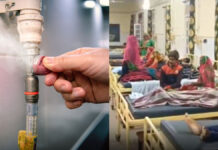The Union Health Ministry has recommended the use of anti-malarial drug hydroxychloroquine in combination with azithromycin on those severely suffering from COVID-19 who require ICU management. In its revised guidelines on the ‘Clinical Management of COVID-19’ issued on Tuesday, the ministry said the drug is presently not recommended for children aged less than 12 and pregnant and lactating women. “No specific antivirals have been proven to be effective as per currently available data. However, based on the available information (uncontrolled clinical trials), the following drugs may be considered as an off–label indication in patients with severe disease and requiring ICU management,” the ministry said while recommending the drug combination. The ministry has removed its earlier recommendation of the use of anti-HIV drug combinations Lopinavir and Ritonavir on a case-to-case basis depending upon the severity of the condition of a patient suffering from coronavirus infection. “As per latest clinical data available from across the work, Lopinavir and Ritonavir drug combination was not found to have significant benefit for patients of COVID-19 so it has been discontinued,” a health ministry official said. This document is intended for clinicians taking care of hospitalised adult and paediatric patients of COVID–19, the guidelines stated. Best practices for COVID-19 including infection prevention and control (IPC) and optimized supportive care for severely ill patients are considered essential, it said, adding that the document aims to provide clinicians with updated interim guidance on timely, effective and safe supportive management of patients with COVID-19, particularly those who have severe acute respiratory illness and are critically ill. The guidelines issued by the health ministry also state that COVID-19 patients may have mild, moderate, or severe illness — the latter includes severe pneumonia, acute respiratory distress syndrome (ARDS), sepsis and septic shock. “Early identification of those with severe manifestations allows for immediate optimised supportive care treatments and safe, rapid admission (or referral) to intensive care unit according to national protocols,” the document states.

Dogra Herald is the media of J & K, breaking language and geographical barriers, connecting J & K to the rest of India.
0191 245 4946
info@dograherald.com
Latest articles
About 90% Indian consumers willing to pay a premium for purchase of EV: Survey
iamjkstarr - 0
With global electric vehicles (EVs) sales expected to boom in the next 12 months, nearly 90 per cent of consumers in India...
CUK’s SoE, DSW observe “Intl Day of Specially Abled Children”
DOGRA HERALD BUREAUsrinagar, Dec 5Jammu and Kashmir BJP general secretary and former minister Dr.Devinder Kumar Manyal, while reacting to the assertion of...
Embracing Border Tourism
The picturesque landscapes and rich cultural heritage along international borders often remain untapped treasures in the tourism industry. However, recent initiatives in...


























